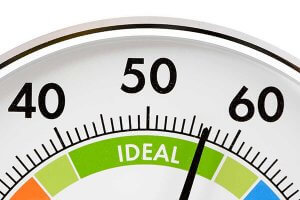
Humidity can have a huge impact on the function and efficiency of your home’s HVAC system as well as your comfort. In fact, humidity can lead to a whole host of HVAC problems if not kept in check, and it can also make your home more susceptible to HVAC invaders like mold and mildew. For these reasons, it is important to get an idea of what your ideal home humidity is at different points in the year, and how you can use your heating & air conditioning system to help maintain ideal home humidity.
Dangers of Too High Humidity
Most people are more familiar with the problems associated with high humidity versus low humidity. While both can be damaging to your health, your home, and your HVAC system, high humidity is more often a problem than low humidity. First, high humidity can contribute to the growth of mold and mildew within your HVAC system, especially in your ductwork. Maintaining an ideal home humidity level can not only prevent the illnesses spread by this growth, but the irritation that can be a problem for people with asthma or other respiratory illnesses. In fact, for people with such issues, the ideal home humidity level might be lower than for others.
High humidity can also be a problem for your HVAC system in that it makes it more difficult for your heating and cooling system to monitor and react to the temperature in your home. So one reason you want to aim for ideal home humidity is that it will improve the temperature in your home as well. This also means that you can save on energy costs by keeping the level of humidity in your home in check.
Risks of Too Low Humidity
Simply removing all humidity does not lead to ideal home humidity levels either. First, dry conditions can be uncomfortable and can contribute to health issues like colds and sinus infections. Perhaps most importantly for the winter, too little humidity will also leave you feeling colder and less comfortable. So before you decide to turn up the heat, consider if your home is too dry and this is contributing to the drafty environment. Finally, too little humidity in the air can increase your risk for home heating fires. Over drying your home can render furniture and other items more likely to start fires, and it can also warp and damage wood, fabric, and all sorts of materials around the home.
How to Achieve Ideal Home Humidity
So, figuring out how to maintain the ideal home humidity levels for your home can be a complicated task. In the winter, you will want to err on the side of more humidity for sure, but in the summer, this can make your AC work harder. Therefore, it is usually worth consulting an HVAC professional whether your home has a healthy amount of humidity for the season or not. From there, you can use humidifiers or dehumidifiers to adjust the output of your HVAC system.
Learn More About Your Ideal Home Humidity Level

To learn more, or find out your ideal home humidity level, get in touch with the St. Louis heating & air conditioning team at Galmcihe & Sons today. Whether you need a whole home humidifier installed for the winter or need to address high humidity in the summer, we can help.









